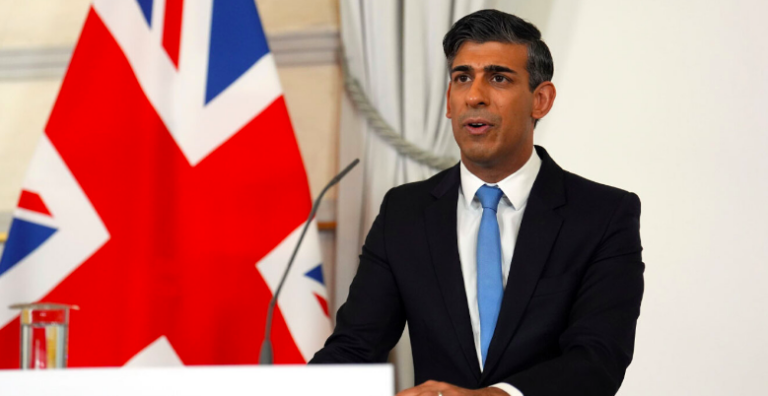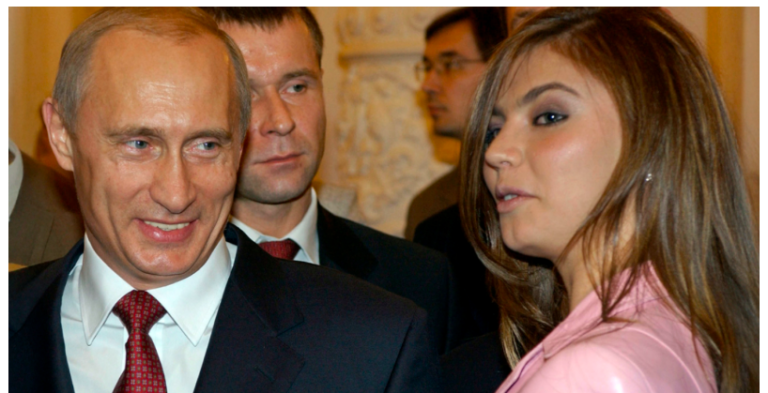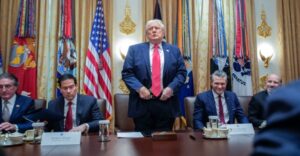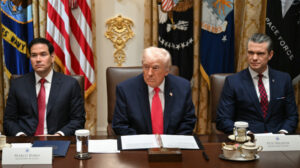The July curse appears to be resurfacing for the Tories, with historical precedents casting doubt on Prime Minister Rishi Sunak’s decision to call early elections. Despite possibly being a desperate move to stop the party’s decline, which has seen it fall nearly 20 points behind Labor in the polls, Sunak risks repeating the fate of Winston Churchill.
Churchill, who led the Allies to victory in World War II, faced the “second worst defeat in Conservative party history” in the first post-war elections on July 26, 1945. British society, weary of conflict, prioritized the Welfare State and infrastructure over Churchill’s charismatic leadership. This historic election loss is well-remembered, and Sunak, whose leadership is less inspiring than Churchill’s, cautiously avoided discussing why July elections are historically unpopular, merely noting, “we didn’t have an election in July since 1945.”
Prime Minister Rishi Sunak’s initial promise as a modern leader has been overshadowed by managerial shortcomings. Despite his claims that his long-term plan to reduce inflation would be successful, British analysts view his call for a national election as a strategic move to minimize electoral losses and solidify his image as a dependable leader during difficult times.
Sunak stressed the importance of Britain choosing its future, urging voters to build on current progress rather than risk regression. This message contrasted with the Labor anthem “Things Can Only Get Better” playing in the background, highlighting Labor’s strong poll performance.
The Guardian suggests the primary reason for the election call is the fear of a Conservative collapse, with concerns about possible “electoral annihilation” leading some MPs to consider submitting letters of censure.
Ministers Esther McVey and Chris Heaton-Harris have expressed reservations about the election date, worried that voters are not yet feeling the benefits of an improved economic outlook. Sunak declared, “Now is the time for Britain to choose its future and decide whether it wants to build on the progress we have made or risk going back to the beginning without certainty,” aiming to counter the Labor Party’s promise of “change” after 14 years of Conservative rule.
Port of Piraeus: 200 kilos of cocaine found in a container of shrimps
Before his speech, Sunak informed King Charles of his decision, prompting the royal family to postpone all events until after the election, following standard procedure during political campaigns.
To bolster his leadership image, Sunak referenced international affairs, the economy, and the war in Ukraine, linking these to Britain’s economic situation. He noted that “Our economy is growing faster than other countries,” emphasizing his plan’s effectiveness and posing the electoral question: “How and who do you trust to continue?” He reminded the public of the challenges faced during the pandemic and subsequent inflation, expressing pride in his decisions and asserting that “what he did is paying off.”
According to Sky News, Prime Minister Rishi Sunak is attempting to regain control of the political agenda by calling an election, hoping to leverage falling inflation despite having lost much of the year’s momentum. This move comes as the latest Opinium Research poll shows Labor widening their lead, with 43% support compared to the Conservatives’ 25%.
Despite Labor’s strong polling position, their leader, Keir Starmer, remains less popular than Ed Miliband was in 2015. Fewer people now believe that Labor is fit to govern or that it has a competent leadership team compared to ten years ago.
The critical question is how Starmer, who has limited public appeal, is likely to become prime minister. Ben Page, head of Ipsos, explains that it is more about public disillusionment with the Tories than enthusiasm for Labor driving the political shift.
Although Keir Starmer, elected as Labor leader in 2020, initially pledged to continue Jeremy Corbyn’s policies, he has since altered the party’s leadership team and policies, abandoning some promises like the £28 billion annual “green” investment. Despite alienating some traditional voters and displeasing party executives, Labor’s support has risen from 29% in the 2019 election to over 40% in recent polls.
Next Steps
Following Sunak’s snap election call, Parliament will be formally dissolved 25 working days before the election, likely in early June. Until then, Parliament will close pending legislative matters, and after dissolution, the House of Lords’ activities will also “freeze.” Ministers will remain in their posts, limited to administrative duties, until a new government is formed.
Change of the Electoral Map
The redrawn electoral boundaries influenced Sunak’s decision. The new boundaries ensure roughly 73,392 voters per district, increasing seats in England while reducing them in Scotland and Wales, similar to changes in 1945.
According to Sky News, Labor needs a margin of over 8.3% to have any hope of winning and would require coalition partners. A margin of more than 12.7% would give Labor a slim parliamentary majority, while a comfortable majority of 30 seats requires a 13.8% difference, and for 50 seats, a 14.5% margin is needed.
Ask me anything
Explore related questions





